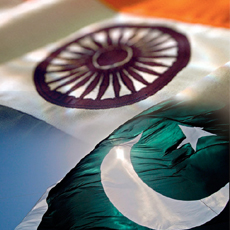India nowhere close to convinced that Pakistan willing to walk the talk
 Paris, July 14 : India is still in doubt whether Pakistan is taking the necessary steps to contain the export of terror from its soil as promised to the world. Till visible steps are taken by the civilian government and the Pakistan army, there is little indication that India will move forward to restart the stalled composite dialogue process with Pakistan.
Paris, July 14 : India is still in doubt whether Pakistan is taking the necessary steps to contain the export of terror from its soil as promised to the world. Till visible steps are taken by the civilian government and the Pakistan army, there is little indication that India will move forward to restart the stalled composite dialogue process with Pakistan.
The composite dialogue process consists of the following issues - peace and security, Jammu and Kashmir, Siachen, Sir Creek, Wullar barrage/Tulbul navigation project, terrorism and drug trafficking, economic and commercial cooperation and promotion of friendly exchanges in various fields
While the foreign secretaries of India and Pakistan will meet in Sharm-el Sheikh on the sidelines of the XVth Non-Aligned Movement (NAM) Summit, and the Prime Minister of the two nations are also scheduled to meet, the composite dialogue process that was abruptly called off by India following the Mumbai carnage of October 2008 is not likely to begin in the next couple of weeks from where it stopped. Though there have been indications that there is tremendous international pressure on India to restart the dialogue process, India stands committed to compelling Pakistan to dismantle the terror infrastructure that has destroyed thousands of lives in the subcontinent and made it one of the most volatile zones in the world.
When asked about the steps taken by the Pakistani administration like handing over the dossier to an Indian diplomat on Saturday which contained some investigation updates carried out by Pakistan, senior Indian officials were almost dismissive about the process, commenting instead on the tardiness of the procedure. It seemed as if the initial impression that comes out of a quick look at the dossier is that it is a face-saving and time-buying tactic. One official even expressed irritation over the seemingly futile exercise of exchanging dossiers when according to the Indian side it was crystal clear who and where the culprits are and that they are not being brought to justice:
The Indian Foreign Secretary Shiv Shankar Menon will meet with his Pakistani counterpart Salman Bashir on the 14th and if Pakistan could have its way, on the agenda, would be a restarting of the composite dialogue process and Kashmir issue. India on the other hand would want to see something of a flowchart of steps taken to crack down on terror training camps, complete stopping of cross border terrorism and bringing to trial or better still extradition of the Mumbai massacre accused.
All eyes are also on the chemistry between Prime Minister Gilani and Dr Manmohan Singh who are to meet on the 16th. The awkwardness of the Zardari-Singh meeting in June 2009 in Yekatarinburg, Russia had left foreign office mandarins in Islamabad livid. The ticking off in the presence of the media by the Indian Prime Minister who is known to measure his words carefully marked a new low as far as summit level meetings are concerned. The embarrassed Pakistan president is said to have backed out of the NAM summit in order to avoid a repeat of a similar situation.
Prime Minister Gilani on the other hand, will try to do a Musharraf at NAM. At the Havana summit in 2006 Musharraf had managed to get India to agree "to continue the joint search for a mutually acceptable option for a peaceful negotiated settlement of all issues between India and Pakistan, including the issue of Jammu and Kashmir in a sincere and purposeful manner."
So far, both the US and European Union have overtly stated that they are not interested in mediating between India and Pakistan, yet it is an open secret that diplomatic channels are on an overdrive to get the two nuclear armed neighbours to begin talks to sort out their mutually nagging issues. And Sharm-el Sheikh will be the staging area for some sort of resumption of talks.
Among think-tanks across geographical divides is a widely held belief that there is a mild disconnect between the political leadership and administration in both countries. The intelligence agencies, armed forces and foreign offices in both countries are knotted up in mutual suspicion that borders on aggression. Whereas the political leadership realizes that to move forward is the only way to step out of the mire, and it is necessary to find some common ground. (ANI)